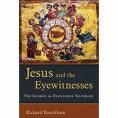Cross posted @ God Is For Suckers!
I honestly admit it: I'm a Jebus Mythicist. I can say with a strong degree of certainty, that I'm utterly underwhelmed by the alleged 'evidence' that most Christians bring with them. They tend to whip out these frenzied copy 'n pastes from some website as if it were some grand salvo to sink the ship of one's atheism.
One can't blame the poor dears for becoming upset when they're laughed roundly out the door.
One of the more irritating 'proofs' I've seen trotted out is this idiotic '500 witnesses' bilge. Here is a link, for those of you who can stomach the intricate mental gymnastics necessary to re-affirm the faith of the believers.
But of course, this addled argument derives directly from the scriptures:
After that, he was seen by more than 500 brothers at one time, most of whom are still alive, though some have died.
Prior to my choice of becoming an atheist, I saw through this nonsense immediately.
If you've ever played the game of telephone, you'd know how daft this argument is. Apart from granting the existence of the Apostles, Mary Magdalene, maybe old Joe of Arimathea (let's say we just grant all the names from the NT), once the math is done, it's somewhat less than one hundred. Who were they? Did they have names? Name half of them, please. This is usually followed by a lot of fum-fah's, an occasional harrumph! and some pretty unspectacular logic. 'Well, they were Christians, so we should just go ahead and believe it.'
Needless to say, a friend-of-a-friend-of-a-friend-of-a-friend doesn't fly in my book, or even in a court of law.
The more we discover about perceptions, the more we realize that there are few absolutes, and grey areas multiply like so many gray hares. Case in point: this article points out just how spectacularly inept human memory tends to be;
What's more, a significant proportion of people seem to be highly suggestible and will quite readily change what they remember if given appropriate cues.
In one famous study, Dutch researchers questioned people about a 1992 accident in which a cargo plane had crashed into a block of flats near Schiphol Airport.
Ten months later, they conducted a survey asking if people remembered seeing the TV film of the plane hitting the building. More than half of the respondents said they had. A later study found that the proportion had gone up to two-thirds.
The problem is, there is no TV film of the accident. Asking the question had itself apparently changed people's memories.
So I think that pretty much puts paid to that argument. In a nutshell: we can barely trust ourselves, let alone our neighbors to give a factual account of an occurrence, but that 'eyewitness' accounts in an ahistorical set of documents should be considered more trustworthy is...madness. To be blunt.
Till the next post, then.














2 comments:
Is Paul the only one who mentions that number? I wonder where he got it from.
Interesting article, too. I remember hearing or reading about what might have been a study into what kids remember. A child is asked about the elephant in his back yard. Initially denies it, but eventually believes and even elaborates on what it looked like, what it was doing, etc. I can't seem to find it anywhere, though. Maybe my own memory is less than dependable...
While I've heard some interesting evidence on the side of a "mythological Jesus" reading of the gospels. But from my understanding the existence of Jesus is as sure as they are for most historical figures--relatively minor ones that is since that's what Jesus was when he was alive. The mention of Jesus in Tacitus and Josephus are as much historical evidence that scholars normally require to prove the existence of a person in the historical record.
You might accuse me of some sort of bias in outlook, but I could probably say the same to someone who comes to the Jesus myth stuff already brimming with a committed and evangelical atheism.
I also find the myth cycle stuff very interesting and culturally rich and exciting, even. Though I'm not sure why a story, which is what the gospels tell, can match the Joseph Campbell-type mythemes etc and still not be based in historical fact. Since the Jesus story was probably told orally first, and in the 1st century Jewish storytelling genre, it's reasonable to assume that such "embellishments" (though that's not much of an accurate term) as him walking on water are likely metaphorical or fabricated with a deeper purpose. All stories follow mythological patterns, even historical ones. Heroditus is a wonderful example, and he was a "historian."
Post a Comment